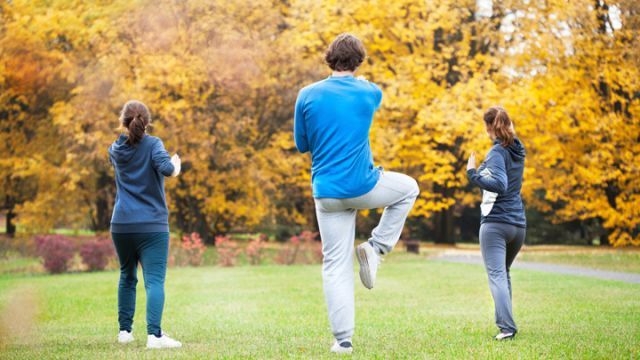
If you’ve ever seen a skilled practitioner of tai chi in motion, you know that it is a beautiful practice, with an almost hypnotic quality. It looks much like martial arts in slow motion, or a rhythmic, flowing dance.
This ancient Chinese practice is more than just beautiful: it’s extremely beneficial to both the body and the mind. Its tenets include control of the breath, mindfulness, posture, balance and gentle motion. Many of the movements are circular, and the entire experience can be very meditative.
Recently, research has been uncovering significant health benefits that stem from the art of tai chi. Much of this research has centered around older adults and the elderly, but people of all ages can benefit, as well.
Tai chi may help prevent falls in older adults
A new study published in the Journal of the American Geriatrics Society compared the effectiveness of tai chi and “lower extremity training” (i.e. exercises designed to strengthen the legs) for their ability to reduce falls in elderly people. A group of 368 people ages 60 and over, who had a history of falls, participated in one of the two programs each week for 24 weeks.
The study participants were also asked to practice either tai chi or their leg exercises for an hour per day at home, for a total follow-up of one year. Participants recorded any falls that they experienced during this time. Results of the study found that the tai chi was notably more effective for reducing falls than the leg strengthening program.
In fact, researchers found that after a year of practicing tai chi, participants were 50 percent less likely to experience an injurious fall than the lower extremity training study group.
As an added (and exciting) benefit, the study authors noted:
“Cognitive function improved to a greater extent in the TCC [tai chi chuan] group than in the LET [lower extremity training] group over the 18-month study.”
Tai chi may improve physical capabilities for people with chronic conditions
A 2015 study published in the British Journal of Sports Medicine found that practicing tai chi led to “improved physical capacity” in older adults diagnosed with breast cancer, chronic obstructive pulmonary disease (COPD), heart failure and osteoarthritis.
For their study, researchers analyzed 21 other relevant studies. In these studies, participants were aged, on average, between their mid 50s and their early 70s. The average length of a tai chi program in the studies was 12 weeks.
Participants experienced improvements including muscle strength, reduced pain and stiffness, reduced breathlessness, shorter sit to stand times and improved overall quality of life.
Summarizing their results, the study authors wrote:
“The results demonstrated a favorable effect or tendency of tai chi to improve physical performance and showed that this type of exercise could be performed by individuals with different chronic conditions, including COPD, HF [heart failure] and OA [osteoarthritis].”
Wait, there’s more!
As you can see, tai chi has a great many benefits for elderly people, and those who are chronically ill with various conditions. However, it also has a world of benefits for people of all ages. A publication by Harvard Medical School explains that tai chi can:
- Enhance your flexibility
- Give you better balance
- Strengthen your muscles
- Provide a mild aerobic workout
Additionally, tai chi may:
- Boost your immune system
- Improve your mood
- Relieve stress
- Help you sleep better
- Aid in weight loss
- Support a healthy cardiovascular system
- Increase bone density
If you’ve never tried tai chi, and you’re looking for a fun, relaxing activity with a world of health benefits, it may be time to find a class or instructor in your area!
— Tanya Rakhmilevich

